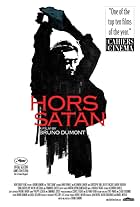Whilst certain elements of Dumont's cinematic approach are commendable, the curiously titled La Vie de Jesus (1997) never really amounts to anything more than a series of laboured, social-realist clichés. As with his other films, such as L' Humanité (1999) and the recent Flanders (2006), we have the presentation of a series of slowly paced, deliberately structured and naturalistically rendered vignettes that propel the narrative - in this case, one that looks specifically at the issues of teenage delinquency, violence and alienation - whilst simultaneously creating a stark sense of drama from the seemingly mundane. As each scene is placed, one after the other, the broader implications of the story become apparent, and it is not until the end of the film that all the ideas become clear and we can think and reflect on the moral message that Dumont is seemingly presenting. However, for me, the film was so slight and seemingly without greater interpretation, that any attempt to really think about or feel this film were somewhat superfluous.
For ninety minutes we follow around our central protagonist Freddy - an epileptic skin-head and motorcyclist - as he spends his days riding around the countryside with his gang, engaging in uninvolving sex with his girlfriend, or harassing the local Arab family. So we have elements of defiance, disappointment, littleness, jealousy, racism and more, all going into the creation of this suffocating pressure-cooker like environment that is never as successfully rendered as it possibly could be. I first saw the film back in 2002 when I was still in my late-teens and I found it somewhat disappointing, especially in the context of Dumont's second feature, the award-winning L' Humanité. I decided to re-investigate the film after having recently viewed the Shane Meadows film This is England (2006), which has a number of similar themes and overall scope. For me, both films are well acted, well directed and have an honesty to them that is rare and laudable, but for me personally, fell flat given the weak script and the overall clichéd subject matter.
Some of the acting is highly impressive, particularly from Marjorie Cottreel as Freddy's put-upon young girlfriend, but David Douche as the central character occasionally comes across as a little stilted; obvious showing his limitation as a non-professional actor. However, despite these slight limitations, it is the overall mood of the film that eventually becomes the most problematic aspect. The film is so relentlessly grim and depressing, with no beacon of hope to cling to, that Dumont's ultimate message is buried beneath the misery. So much so in fact, that any moment of real dramatic tension is stifled, highlighting its own clichés and plunging the depths of third rate melodrama. Dumont would go on to improve his craft with the aforementioned L' Humanité, in which he drops the clichés and refines his characters to the point of real, searing interest. La Vie de Jesus isn't a complete failure; committed cinema goers will find some level of interest from the uncomplicated visual presentation and slow meditation on violence and guilt, however, too much of the film (for me) missed its target on almost every level.






















